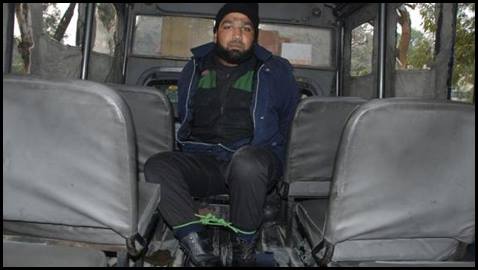Killing In The Name of God
The Supreme Court of Pakistan on Wednesday [October 7, 2015] retained the judgment of Mumtaz Qadri — the murderer of Salman Taseer — by an Anti Terrorism Court.
Qadri, a former commando of Punjab police’s Elite Force, was convicted to death by an Anti-Terrorism Court (ATC) in October 2011 for assassinating former Punjab governor Salman Taseer in Islamabad’s Kohsar Market. Qadri said he assassinated Taseer over the politician’s articulated repugnance to blasphemy laws of the country.
He’d confessed to mowing Taseer down outside an up-market coffee shop near to the latter’s residence in Islamabad on Jan 4.

Following the sentencing, Qadri’s counsel challenged the ATC’s decision through two applications; one was that Qadri’s death sentence should be rescinded; second asked for Section 7 of the ATA to be declared void from the sentencing.
The Islamabad High Court’s (IHC) March 9 decision which had rejected Qadri’s application against his death sentence but accepted his application to void the Anti Terrorism Act’s (ATA) Section 7,was overturned by the apex court on October 7.
A three member bench of SC, headed by Justice Asif Khosa, allowed the federal government to re-include terrorism charges against Qadri.
During the proceedings of the case Qadri’s counsel argued that the accused was an honest man and he killed Taseer in accordance with Shariah and the teachings of the Holy Quran and Muhammad [PBUH], because he was persuaded that the victim had committed blasphemy by saying blasphemy law ‘black law.’
During the proceedings, Justice Asif Khosa and Justice Dost Mohammad made historical arguments with Qadri’s counsel. Dost Mohammad said we’ve to see if the deceased committed blasphemy or was talking about blasphemy laws adverse effects and misuse. He underscored that victim was talking about the defects in the blasphemy law, which were sometimes misused for personal benefit.
Asif Khosa asked, will it not instill fear in society if an individual take sensitive matters like blasphemy in its hands rather than going to the courts? In a democratic government, people have right to criticize or discuss merits and demerits of any law made by the parliament, he observed.
Meanwhile, Sunni Tehreek [ST] and some other clerics has decided to file a review petition in SC. They say Qadri had done nothing against the Shariah.
In a country where even clerics of different sects don’t offer prayers mutually, this current blasphemy law is prone to misuse. We’ve seen a number of such turpitudes. In 2009, several villagers massacred Christian children, women and men in Gojra [Punjab] on the pretext of blasphemy.
The Kot Radha Kishan persecution of Hindu couple on blasphemy charges and Youhanabad’s burning of houses of christian families on the accusation of blasphemy are not the only incidents but our history is full of such incidents after Gen Zia’s draconian contribution to Blasphemy Act.
Different sects of Muslim’s are also facing this threat. Shia’s are also facing this blasphemy menace but in less intensity than Christians, Hindus in Pakistan. While dealing with Shia’s, they replace blasphemy with ‘takfir’ and then they’ve the right to kill them for God’s sake. Before the elimination of Shia militia outfit Sipah-e-Mohammad, there was a fierce fight between the Sunni militia outfit Sipah-e-Sahaba and Sipah-e-Mohammad. The clashes were so deadly that in mid 90’s, under Nawaz government, LEA’s initiated an operation mainly against S-e-M in Thokar Niaz Baig area of Lahore. After that the raise in Shia killing is palpable but the reprisal to such killings by Shia’s has also mowed down some conspicuous violent Sunni leaders.
The SC verdict to uphold Qadri’s death sentence is admirable and precedential but will this decision pressurize the legislatures to tweak/amend the current blasphemy law? Or will the parliament strive to diminish the misuse of this law? Will the state prosecute the persecutors? Will the clerics disseminate the real message of Quran which is irenic not ironic? Will they literate their followers about the unifying nature of Islam?
These are the questions still to be answered and many more verdicts, like SC’s on Qadri case, are needed by our judicial system. The role of government/state and clerics is much more than of anyone else’s. Let’s see if the sanity shown by our Judges in this case is not limited to high profile cases.

The basic ailment of society is it’s intolerance for dissension. The bigotry fuels hooliganism. The role of intellectuals and teachers to aware masses about the benefits of tolerance is direly needed. The more the society is tolerant for dissension the less it is susceptible to destruction. Why can’t the state/government educate masses via mass media that our prosperous survival is dependent on our tolerance for disagreement like ISPR is thriving for the perception that terrorists are against the very quiddity of Pakistan’s sovereignty?
Indians these days are slaying every Muslim they find eating or ate beef. They’re even killing the slaughter houses owners in the name of God. A couple of days back, an angry mob invaded a village in India and killed a man, for being accused of eating beef, whose son is in Indian air force. Their madness has no method and the intolerance of Indians/Hindus for dissension is pretty discernible. In Pakistan, the intolerance seed was sown by Gen Zia in 1980’s whose violent fruits we’re experiencing till now but how many years Indians will experience violent fruits of this intolerance seed sown by Modi in 2015?
This region is in dire need of tolerant friendly policies/campaigns by the local leaders and media.
But indeed October 7 is a good day for Salman Taseer’s family at least.

